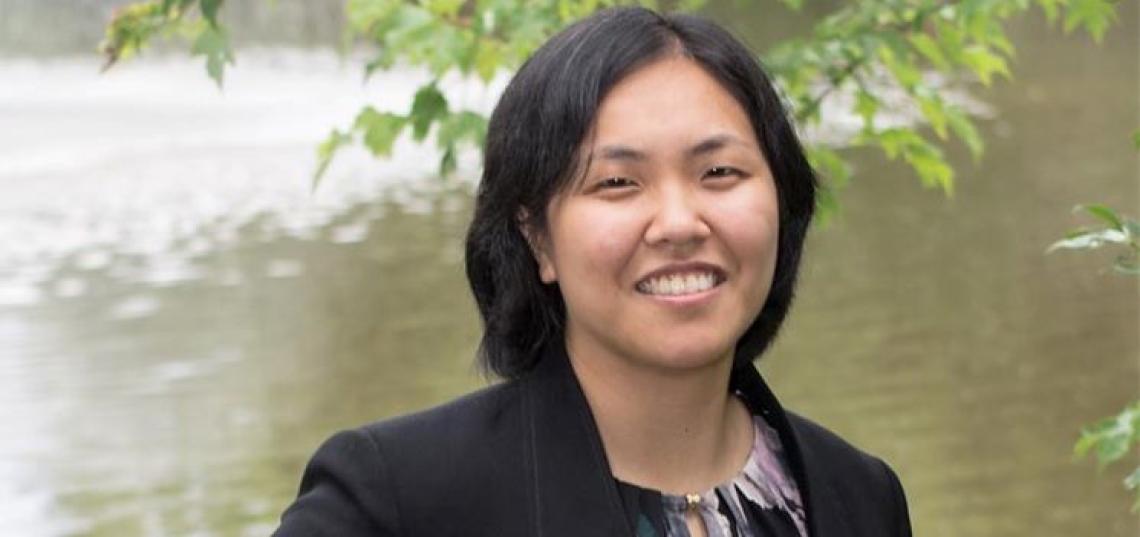
Proud Rutgers alumna Stephanie Mikitish, Ph.D.'17, MLIS'10, RC'08 is a data analyst with the Library of Congress, the oldest federal cultural institution in the United States. In a recent interview with SC&I, she shared her reflections on her career, Rutgers' role in preparing her, and the pandemic. She ends with terrific advice for anyone considering pursuing a career in library and information science (LIS).
SC&I: Share a little about your Rutgers experience.
SM: I'm proud to be a three-time Rutgers grad, having earned a bachelor's degree in History from Rutgers College, a Master of Library and Information Science (MLIS, now the Master of Information or MI), and Ph.D. in Library and Information Science from SC&I. I chose to transfer to Rutgers after spending two years at the United States Military Academy because of Rutgers' academic reputation and relative affordability. Sometime in my final semester, I decided to become a librarian because the educational and technological aspects of librarianship intrigued me. Rutgers has the only ALA-accredited school in the state, so I applied for SC&I's MLIS program and a circulation assistant position at Alexander Library. I was fortunate enough to get both, and the supportive colleagues I found in the Rutgers University Libraries and SC&I encouraged me to pursue my doctoral studies at SC&I.
SC&I: Tell us about your current position at the Library of Congress.
SM: The Library of Congress serves the United States Congress and is the country's national library. I am a data analyst designing, supporting, and developing reports for personnel- and acquisitions-related systems. Although it might seem different from most library and information science jobs, I view it as a natural extension of my former roles as circulation staff and User Engagement and Assessment Librarian, which was the academic librarian position that I had after completing the doctoral program. The day-to-day work involves meeting with managers and staff to understand their information needs, suggesting different systems/procedures, answering their questions, performing the search/analysis, and reviewing the results.
SC&I: The pandemic affected libraries greatly. Describe how you had to pivot.
SM: Throughout the pandemic, there has been an increased need for reporting, and I work with managers and staff to develop tools to ensure that deadlines are met despite the challenges of remote and now hybrid work. One tool was a telework request system to help ensure that employees doing the same work across the Library can telework a similar number of days. Another tool was a set of acquisition dashboards that combined data from multiple systems to monitor the statuses of the hundreds of contracts and grants awarded by the Library each year.
SC&I: How did your studies at SC&I prepare you for your career?
SM: SC&I courses gave me both the theoretical framework and practical experience that led me to a position at the Library of Congress. I was fortunate that my favorite instructors in my master's and doctoral courses agreed to be on my dissertation committee. Professor of Library and Information Science Marie Radford, my dissertation chair, was also my advisor in the master's program. Her library management course (570) and qualitative methods course (603) sparked my interest in how libraries can run more effectively and how qualitative data could illuminate the statistics/metrics kept by libraries. Professor Emeritus Dan O'Connor suggested that I consider applying to government LIS positions, and I learned how to use numbers to tell stories in his research methods course (511), collection development and management course (532), financial management course (573), and quantitative methods course (604). The late Associate Professor Ross Todd's library theory course (656) introduced me to helpful ways of explaining how people interact with information, and I try to emulate his positive attitude and enthusiasm for the work of my colleagues and students. Finally, although I did not have her as an instructor, Professor Emerita Kay Cassell recommended that I teach reference resources and services (540) and collection development and management (532), and I drew heavily from her syllabi for those classes when developing my own.
SC&I: What career advice would you like to share?
SM: I recommend saying yes to as many opportunities at work and school that you have the time and energy for if they interest you and can benefit your organization. The grass is greener if you water it! Secondly, a SC&I education prepares students for success in a variety of fields, and I would encourage them or anyone else looking to make a career move to have an informational interview with anyone whose work intrigues them. Most SC&I graduates are in the information business and are happy to connect students and fellow alumni with resources and people in their networks. These connections can help suggest ways for job seekers to translate their skills or develop new ones to become more competitive candidates.
I would also recommend that potential job seekers ask interviewers to describe their organization's pandemic response. How were the decisions to close and reopen made, communicated, and implemented? Did staff across the organizations at different levels have a voice in these decisions? What were the lessons learned? The answers to these questions will provide invaluable information about the organization's culture. I would encourage candidates to seek out places where they will fit into that culture and organizations whose actions align with the values they espouse.
Photo: Courtesy of Stephanie Mikitish
